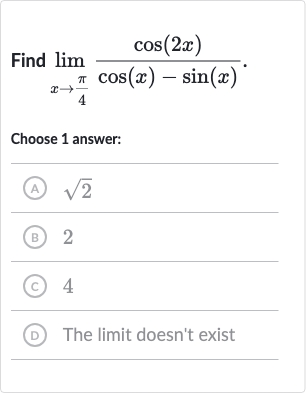Full solution
Q. Find .Choose answer:(A) (B) (C) (D) The limit doesn't exist
- Substitute Values: We need to find the limit of the function as approaches . Let's first try to directly substitute into the function to see if it yields a determinate form.Now, substitute these values into the function:We get an indeterminate form , which means we need to apply L'Hôpital's Rule or algebraic manipulation to find the limit.
- Apply L'Hôpital's Rule: Since we have an indeterminate form, we can apply L'Hôpital's Rule, which states that if the limit of as approaches a value is or , then the limit of as approaches is the same as the limit of as approaches , provided that the latter limit exists.Let's find the derivatives of the numerator and the denominator.The derivative of with respect to is .The derivative of with respect to is .
- Find Derivatives: Now we will apply L'Hôpital's Rule by taking the limit of the derivatives: Let's substitute into the derivatives:Now, we substitute these values into the limit of the derivatives:
- Apply L'Hôpital's Rule Again: We have found that the limit of the original function as approaches is . Therefore, the correct answer is (A) .
More problems from Is (x, y) a solution to the system of equations?
QuestionGet tutor help
QuestionGet tutor help
QuestionGet tutor help
QuestionGet tutor help
QuestionGet tutor help
QuestionGet tutor help
QuestionGet tutor help

